LIFE SPORT
Keywords: ada o'higgins, art spaceg, crisis, Debt, life sport, reek, sweatpants
Athens sweats
LIFE SPORT
Athens Sweats
Everyone wears sweatpants. Beneath the loose, comfortable cotton, you could be anyone. A successful executive or a restless, jobless youth. Says Athens based collective LIFE Sport on their website ‘Sweatpants unite contradiction, they are a symbol of defeat or paralysis for some, a statement of ultimate resistance and emancipation for others.’
LIFE Sport is both a sweatpants shop and an art space. LIFE SPORT is a shop seeking to generate alternative arts funding by hosting presentations and varied services- because life is a sport and this collective is in it to win.
Ada O’Higgins: Being both an art space and a shop, the LIFE SPORT project highlights the possible similarities and differences between these two spaces. What defines an arts space from a shop for you? How has the project influenced your conception and interest in these categories of exhibition and selling products/artworks?
LIFE SPORT: We can obviously consider the conceptual differences in terms of how value is created or branding techniques for example, but for us the main thing that defines a shop from an art space is the practicality of how to operate legally and not be limited by these imposing categories. Right now LIFE SPORT is in between a non-profit art space and a shop. We think it’s important to blur the division and try to keep it as open as possible for the potential of creating a new model that we can exist in. The role of the LS shop changes with its activities, for example it becomes a backdrop for presentations or workshops, or it functions as an entrance to an underground bar or exhibition. However, sometimes a science occurs and the shop/artspace becomes something else, something that we cannot yet translate or categorize. We find working from a place that we don’t quite understand to be a much more productive place. Hybrid forms are healthy places in the way that they allow for this uncertainty and decidedly resist limitation. The way LS currently operates enables opportunities to act outside of itself, e.g. other spaces and institutions have hosted versions of the shop. We are utilizing the art system that we are part of to sell our product and we use their formats to advertise our brand.
Dealing with sweatpants opposed to artworks allows for a less abstract relation. The prices are based on what we get charged by our producers in Athens, the material plus labour cost. Sweatpants are so easy, people understand them without needing to engage further with LIFE SPORT or the ideas we are invested in. It feels good to be part of a more inclusive market.
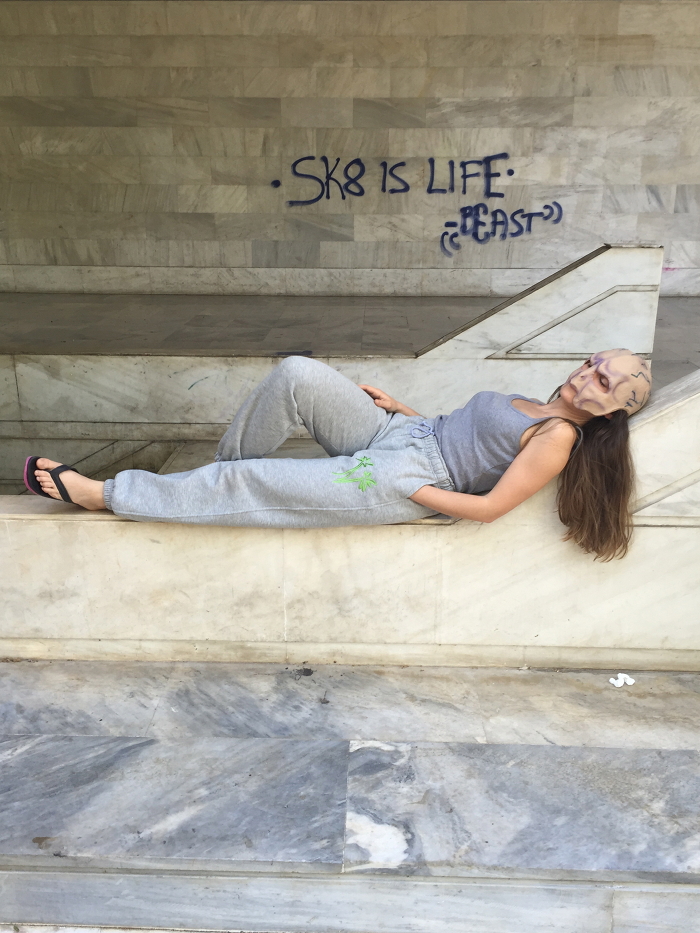
Puppies Puppies & LS 1
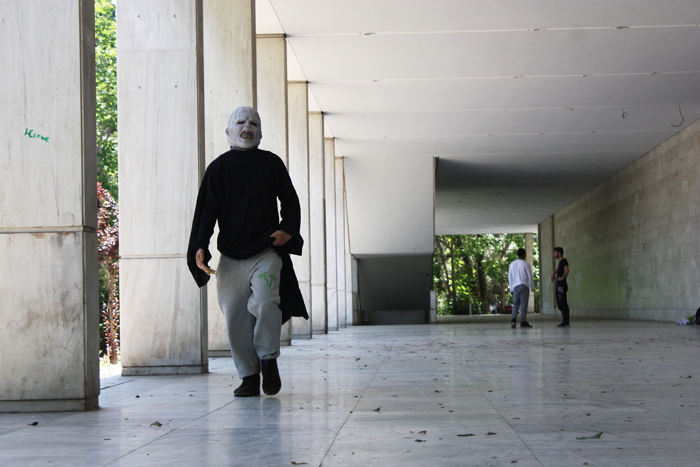
Puppies Puppies at LS (Trash Strike)
Ada O’Higgins: What are your thoughts on the Greek debt crisis? And the european refugee crisis? How is your art relating to that? How is the artist community in Athens reacting to it, as far as you know?
LIFE SPORT: There is common sentiment that the Greek debt crisis is used as a mechanism to align the South with the North. Being in the position of having to repay an impossible amount of debt without the means to do so holds Greece hostage to EU enforced regulations that are beneficial to some countries whilst draining others. The process of structural reforms and repayment comes at the cost of loosing independence, identity and social integrity. Last year was politically emotional and there was a moment of panic and excitement during the July referendum when the Greek people voted OXI (No) to continued austerity. The possibility of radically breaking from the Eurozone and thereby opening to a future unknown felt both frightening and empowering. As we know this did not happen, however, perhaps some change in perspective occurred. The ongoing debt negotiations emphasized that it is a matter of manipulation of terminology also and that abstract problems require abstract solutions. The effects however are real and austerity continues. We are all used to an unsustainably high level of consumption and comfort, which makes any decline of the living standard difficult to accept and adjustment is slow and painful.
The refugee crisis is adding to Greece’s instability. It is a global responsibility but it’s unfortunate and economically straining to be the first port of call. It looks like Europe is sadly not able to deal with it in some form of unison. Also, an increasing xenophobic mindset in Europe is happening, nationalistic tendencies are rising and the terms terrorism and refugee crisis seem to have become intertwined. We can learn most from the people on the islands who work together and self-organise in order to deal with the immediate situation.
LIFE SPORT tries to exercise something by consciously addressing standstill and finding ways to move beyond when we don’t know how to move forward. I think it’s integral to admit that it is just a way of trying. It’s really from a place of exposed vulnerability from where we can gain strength. We are invested in the local community by engaging people and making something happen. It’s a love for something larger and an optimistic project that tries to activate potential, working with less and trying to turn that into bigger effect. LS is born out of a new (forced) inactivity that comes along with the economic situation at hand, which opens up the necessity and space to contemplate and become more resourceful and self-sufficient.
With regard to the local art context, it seems that the heightened attention on Greece due to the ongoing financial crisis has had an effect on self-image and self-identification. The global media went through several phases of characterising the Greek crisis, from humiliation to resistance and now victimisation. Obviously these characteristics have been incorporated and processed by the art community also, not only because crisis is omnipresent but also because it exports well.
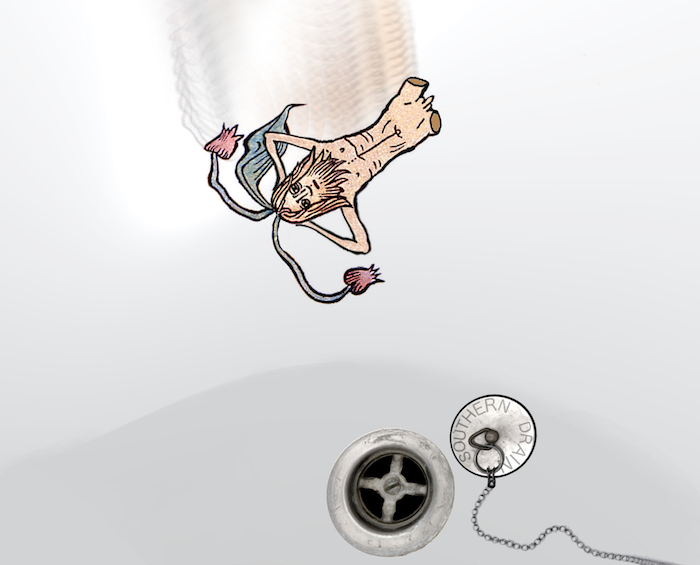
‘Southern drain’ Stefanos Mandrake 2016
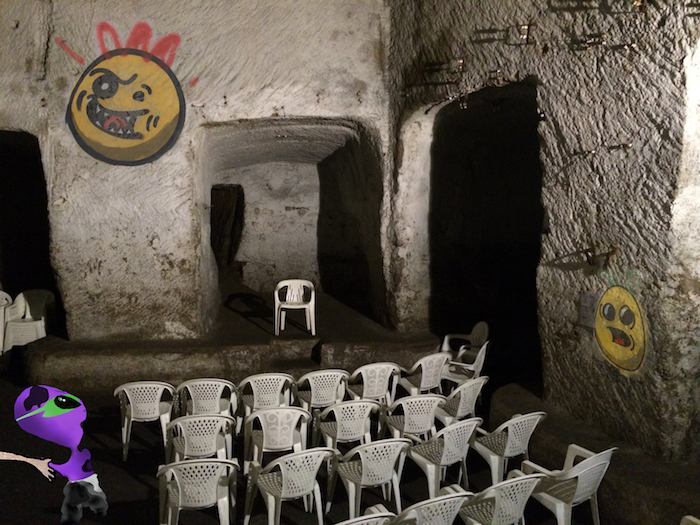
‘Smells like sacrifice’ Stefanos Mandrake 2015
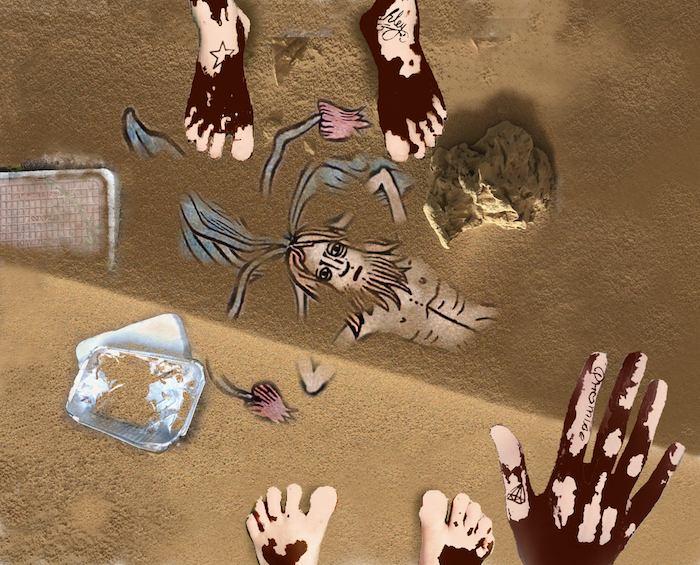
‘What is it?’ Stefanos Mandrake 2016
AO: I’m interested in your intent to generate alternative arts funding. What are the issues with current arts funding in Greece/Europe and how do you envision the situation evolving?
LS: Selling sweatpants is a pursuit for self-sufficiency and an attempt to generate alternative arts funding in a time and place where there is none, or very little. In Greece and most of Southern Europe the funding available is mainly from private foundations. They allocate some money to national projects but mainly fuel their own value creation by inviting renowned artists to do the same shows that are done elsewhere and thereby replicate what is happening in art capitals around the world.
The problem with most European arts funding generally is that it isn’t really doing any new investments. Funders give to gain and they usually don’t see value in something that can’t immediately be utilized. The funding route for young projects is less and less feasible, big parts of it go to already established institutions. There usually are a number of requirements to fulfill, which means having to compromise.
Artists are rarely able to create new formats but merely fulfill already existing, often stifling ways in which art can supposedly be done, distributed and consumed. The formats that exist (e.g. exhibitions, talks, publication) are serving institutional structures already in place and aren’t challenging. It’s essential to destabilize such confinements, in order to unlock potential in other ways and to create new choices.
Unfortunately, arts funding as it exists excludes a range of creative practices that are more subtle, soft or complex, that aren’t that easy to accommodate and that don’t result in measurable outcomes or commodities. We want to focus our energy on where we believe it’s most needed, in considering how we are inviting artists, and what for! It seems no one is asking these questions. As LIFE SPORT we feel there’s the need to generate alternative funding mainly because there isn’t enough but also in order to support practices that don’t fit into the existing modes of presentation, that are not ascribed to nationality, that don’t follow the logic of the art market and that resist being reduced or simplified. We want to enable ideas and people that remain in a state of transformation.
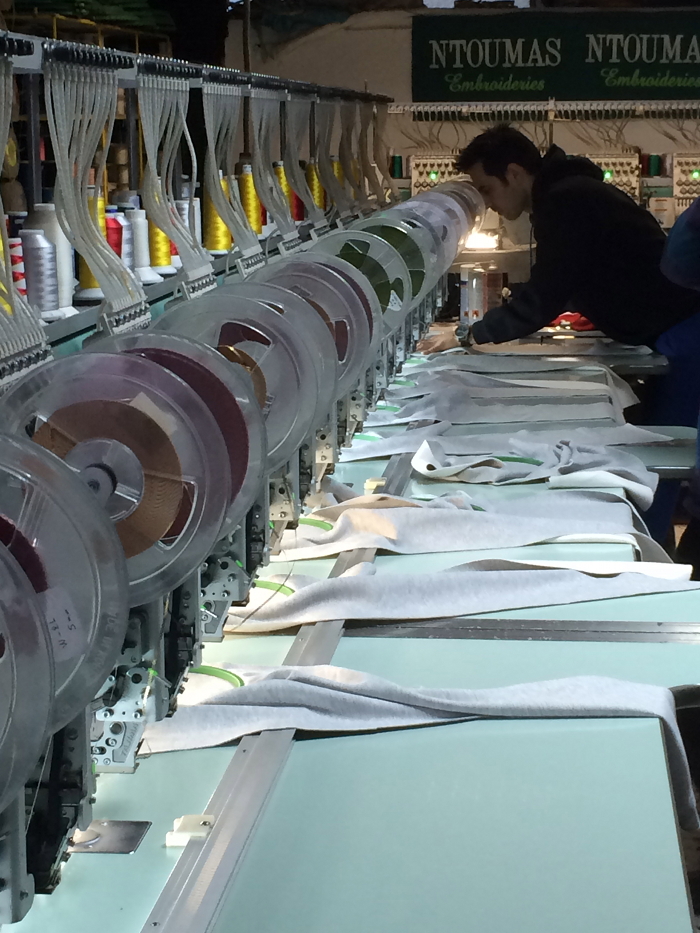
Making LS sweatpants
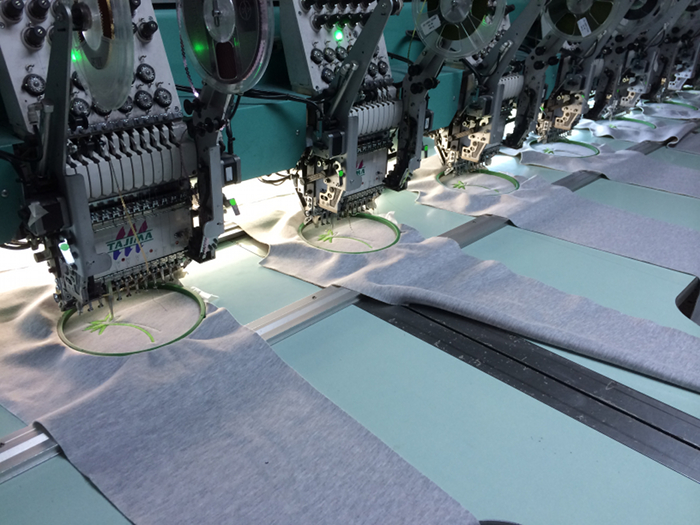
Making LS sweatpants
AO: How have you experienced a loss of ‘independence and self-empowerment’? How have the various Life Sport projects managed to return a sense of independence to your individual and/or collective practices?
LS: LIFE SPORT wants to activate and initiate, opposed to waiting for something to happen from outside that we can’t direct. As a way to regain a sense of self-empowerment, we strive to be less alienated from basic life aspects and revive a connection to the essential and sensual. We invent coping mechanisms for ourselves and devise ways of spending time, also in preparation for a future without work. We sell sweatpants to fund our projects independently.
Karl Lagerfeld once famously stated that ‘Sweatpants are a sign of defeat, you lost control of your life so you bought a pair of sweatpants.’ This is actually a very real situation, the crisis means a loss of control for many. However, I think autonomy is lost on many levels and not just in economic terms. It’s a systematic process of institutionalization whereby we are gradually alienated from what we know intuitively. We learn to internalize virtues of utility, productivity and to value individual over collective achievement. LIFE SPORT is genuinely in search for friendlier tactics that are beneficial to more people opposed to aiding the merely self-serving career of one. I think we are striving for a perspective that takes into account all perspectives. It’s about understanding that we can’t all function the same way but that our contribution lies in exactly those differences in what we can and can’t do. To acknowledge that every single aspect is of equal value and importance is a form of gaining empowerment that is not just self-serving.
Part of LIFE SPORT’s activities aim to reclaim inherent knowledge and basic skills, retrieving a life outside of economic calculation and working with what we already have or what is easily accessible. We want to activate artists beyond the usual formats and seek collaborations, collective approaches, fictional artists and services that surpass the familiar and the confines of the art context. We are trying to extract that drive or motivation that makes artists want to be artists in the first place and distribute that energy.
Our activities often take simple forms. For example, we host slide shows (LIFE SHORTS) where people share something seemingly trivial, photos and stories of their lives or parts of it, as a way to address the private publicly in the real space. We have hosted social evenings including playing cards (with Mark Aerial Waller and Vassiliki Holeva) and a series of herbal seminars (with Stella K), during which we learned to make our own cost-efficient medicine and cosmetics. Right now we are interested in learning from a local shaman. We want to embrace the irrational and mythological undercurrents as a guide towards the unknown, something that needs to be felt rather than understood. It’s a matter of learning to listen to different voices.
LIFE SPORT seeks to work with artists that share our ideas of self-empowerment and support our aim to generate alternative funding. LS sweatpants have been featured in Nina Cristante’s Fitness Povero austerity workouts and in a promotional photoshoot with Puppies Puppies. Fictional artist collective Stefanos Mandrake has made an own sweatpants edition as part of their exhibition at LIFE SPORT titled ‘black on black’ and Katerina Kana presented an edition of dresses (SCULPTOR NGC 55) that are symbolic for a personal life transformation or resurrection. Sharing a Southern perspective on tourism and other terrors, Portuguese artist Pedro Barateiro presented a series of drawings and his film The Current Situation alongside LIFE SPORT’s ed. 3 Combo purple/grey, a mix-brand sweatpants edition. In the film he parallels two events happening at the same time, the cutting down of palm trees due to a plague throughout the Southern countries and the economic crisis.
We are especially interested in the work of fictional artists and collectives, as they naturally pose a challenge to institutional structures and aren’t easily processed. They dissolve identity and form a mask through which we can speak as many. It’s a way to express ourselves and say it more explicitly but with less risk. Also, collectives undergo an interesting negotiation process that forms the basis of any self-organisation. LS doesn’t strive to be a conclusive project and we are trying to not rush anything. When you take the time to listen, things come quite naturally.
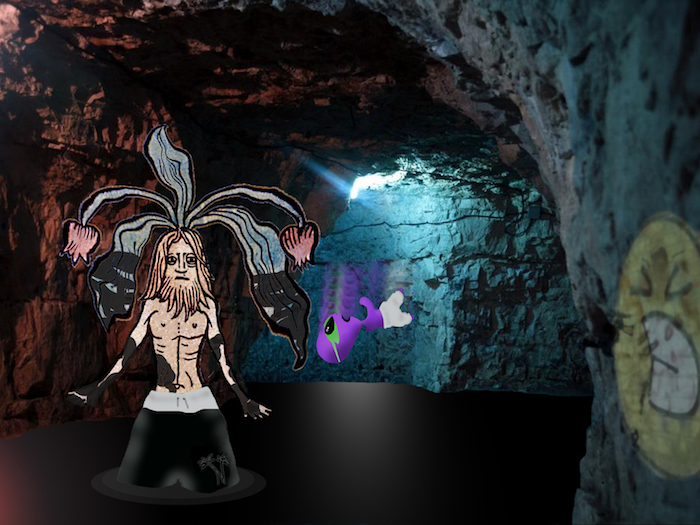
‘AAARRGH.. Black, sticky and warm’ Stefanos Mandrake 2015
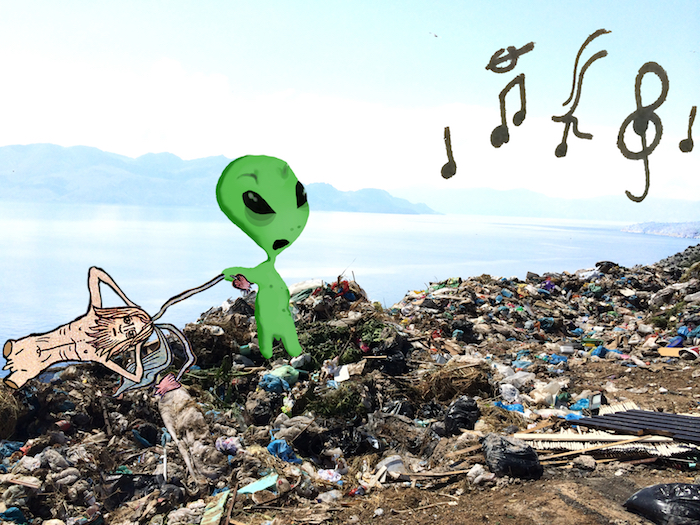
‘Trash music’ Stefanos Mandrake 2016
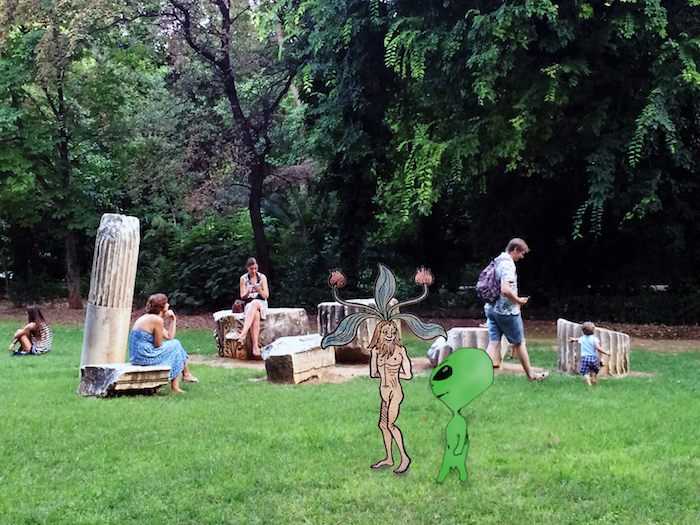
‘This place is ruined’ Stefanos Mandrake 2015
AO: Can you tell me more about your year-long research of Athenian lifestyles that culminated in the design of the sweatpant? A sweatpant seems like a pretty simple thing to design, what were the challenges?
LS: It started with the observation that many people in Athens wear grey sweatpants. By making short films of them with our phones over the period of a year or so, we created a personal map and narrative, as well as a more general portrait of the city. The sweatpants function as a filter, it’s about focusing on something in a time when it is really hard to focus.
I think the sweatpants films celebrate diversity and complexity within sameness. In a way they flatten reality and people by rendering them the same but without denying subtleties and differences. Every sweatpants wearer is unique and each film is intimate and has a personal memory attached to it, only in the collective they become a voice and seemingly take position. Of course, the films are also voyeuristic and come with a certain paranoia, a possible fear of consuming or being consumed.
Sweatpants are worn by all kinds of people in all kinds of situations, which make them so radically inclusive. They can stand for being lazy and wanting to feel comfy but they are also a statement of resistance. Originally, they are a garment associated with leisure, comfort and deferral. In a way they symbolize a refusal or avoidance to being utilized. You adopt a state of exemptness when wearing sweats, they signal I’m currently not available (to perform). That’s what makes them a luxury statement also: You can afford to take yourself out of constant availability. To me, sweatpants indicate a pause or state of paralysis, whether out of choice or not. I like to think that they represent a seemingly defeated multitude, an army of grey sweatpants wearers posing a soft threat.
Claiming a widely available mass produced product like sweatpants our own is an impossible task but there’s an inherent resistance to trying to come up with something new. We have been stuck in a loop of repetitive reinvention of the ever-same for so long, there’s nothing new to it, not the product nor the business model. To participate in the circuit in that way, we are more prepared and ready for failure. It wouldn’t be such a shock.
LIFE SPORT’s first edition of sweatpants have been modeled on my favorite pair of Nike grey sweatpants from the 90s. Only recently I realised that they were made in Greece. It was the last production of Nike in Greece before they went to cheaper labour countries. To find manufacturers and deal with the local bureaucracy was challenging. We associate sweatpants with ease and leisure, whilst LS is undergoing an extremely laborious and inefficient process of making them with a small family business in Athens. Meanwhile Adidas is about to open their first Speedfactory consisting entirely of robot workers! LIFE SPORT as a sports brand might not be competitive on any level but it feels good and real to activate local producers in the way we do, even if our efforts will not revive the textile industry in Greece.
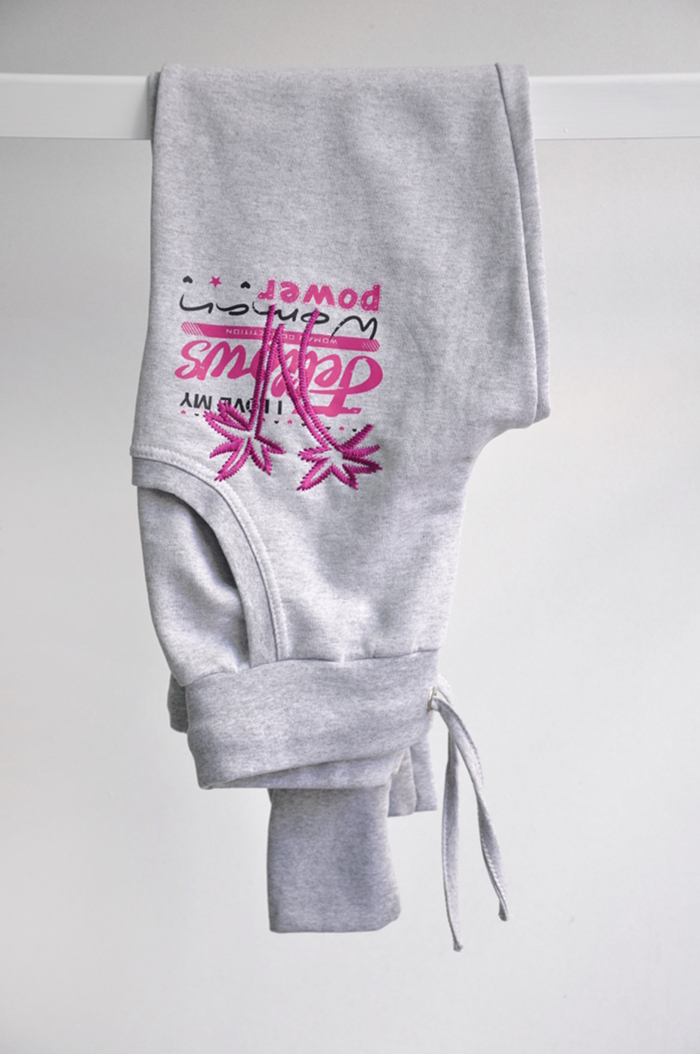
An LS sweatpant